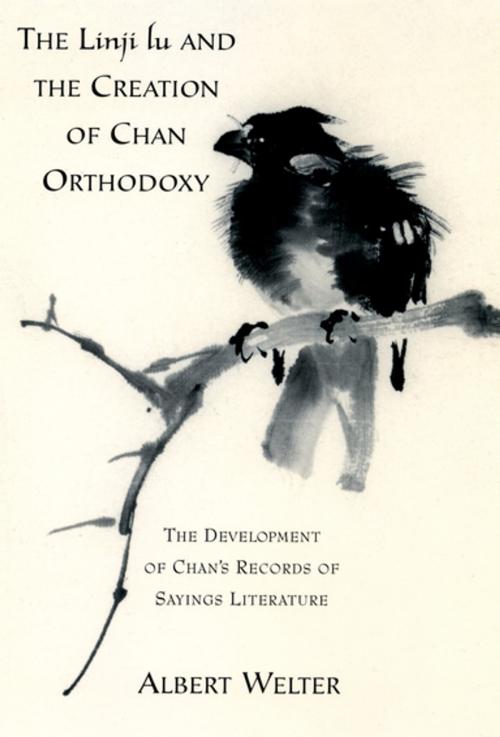The Linji Lu and the Creation of Chan Orthodoxy
The Development of Chan's Records of Sayings Literature
Nonfiction, Religion & Spirituality, Eastern Religions, Zen Buddhism| Author: | Albert Welter | ISBN: | 9780199887057 |
| Publisher: | Oxford University Press | Publication: | February 28, 2008 |
| Imprint: | Oxford University Press | Language: | English |
| Author: | Albert Welter |
| ISBN: | 9780199887057 |
| Publisher: | Oxford University Press |
| Publication: | February 28, 2008 |
| Imprint: | Oxford University Press |
| Language: | English |
The Linji lu, or Record of Linji, ranks among the most famous and influential texts of the Chan and Zen traditions. Ostensibly containing the teachings of the Tang dynasty figure Linji Yixuan, the text has generally been accepted at face value, as reliable records of the teachings of this historical figure. In this book, Albert Welter offers the first systematic study of the Linji lu in a western language. Welter places the Linji lu in its historical context, showing how the text was manipulated over time by the Linji faction. Rather than recording the teachings of the illustrious patriarch of legend, the text reflects the motivations of Linji-faction descendants in the Song dynasty (9601279). The story of the Linji lu is not simply the story of one heroic figure, Linji Yixuan, but the story of an entire movement that sought validation through retrospective image making. The success of this effort is seen in Chan's rise to prominence. Drawing on the findings of Japanese scholars, Welter moves beyond the minutiae of textual analysis to place the development of Linji lu within the broader forces shaping the development of the Chinese Records of Sayings literary genre as a whole.
The Linji lu, or Record of Linji, ranks among the most famous and influential texts of the Chan and Zen traditions. Ostensibly containing the teachings of the Tang dynasty figure Linji Yixuan, the text has generally been accepted at face value, as reliable records of the teachings of this historical figure. In this book, Albert Welter offers the first systematic study of the Linji lu in a western language. Welter places the Linji lu in its historical context, showing how the text was manipulated over time by the Linji faction. Rather than recording the teachings of the illustrious patriarch of legend, the text reflects the motivations of Linji-faction descendants in the Song dynasty (9601279). The story of the Linji lu is not simply the story of one heroic figure, Linji Yixuan, but the story of an entire movement that sought validation through retrospective image making. The success of this effort is seen in Chan's rise to prominence. Drawing on the findings of Japanese scholars, Welter moves beyond the minutiae of textual analysis to place the development of Linji lu within the broader forces shaping the development of the Chinese Records of Sayings literary genre as a whole.















